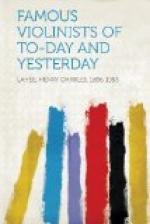Few teachers have formed as many distinguished pupils as Massart, for in 1843 he was appointed professor of violin at the Paris Conservatoire, where his energy, care, exactness, and thoroughness brought him an immense reputation. Lotto, Wieniawski, Teresina Tua, and a host of other distinguished violinists studied under him: among them also was Charles M. Loeffler, of the Boston Symphony Orchestra.
Massart was also an excellent quartet player and gave many delightful chamber concerts, with his wife, who was a pianist. He died in Paris, February 13, 1892.
Charles Auguste de Beriot, who holds a position of great importance in the history of violin playing and composition, was born in 1802 at Louvain. He had the misfortune to be left an orphan at the age of nine. His parents were of noble extraction, but at their death he was left entirely without fortune, and was taken in charge by M. Tiby, a professor of music, who had noticed the little boy’s love of the musical art, and had already taught him to such good purpose that he was able even at that time to play one of Viotti’s concertos in public so skilfully that he received the hearty applause of the audience. He also took lessons of Roberrechts, one of Viotti’s most noted pupils.
De Beriot was a youth of contemplative mind and of high moral character. He formed the acquaintance of the scholar and philosopher Jacotot, who imbued him with principles of self-reliance, and exerted an influence over him which lasted throughout his life.
De Beriot learned from his guide, philosopher, and friend that “perseverance triumphs over all obstacles,” and that “we are not willing to do all that we are able to do.”
At the age of nineteen De Beriot went to Paris, taking with him a letter of introduction to Viotti, who was then the director of music at the Opera, and he succeeded in gratifying his greatest ambition, which was to be heard by that illustrious violinist.
Viotti gave him the following advice: “You have a fine style. Give yourself up to the business of perfecting it. Hear all men of talent, profit by everything, but imitate nothing.”
De Beriot applied himself assiduously to his studies, entering the Paris Conservatoire and taking lessons of Baillot. In a few months, however, he withdrew from the Conservatoire and relied upon his own resources. He soon began to appear in concerts, generally playing compositions of his own, which won him universal applause by their freshness and originality as much as by his finished execution and large style of cantabile.
In 1826 he went to London from Paris, his first appearance taking place on May 1st, before the Philharmonic Society. Wherever he appeared, either in London or the provinces, he was greeted with enthusiasm, and he established a lasting reputation.
His appearance in England antedated that of Paganini by about five years, and it has been questioned whether the impression which he made would have been less if he had appeared after instead of before the great Italian. It seems, however that De Beriot continued to meet with success even after the advent of Paganini. His playing was distinguished by unfailing accuracy of intonation, great neatness and facility of bowing, grace, elegance, and piquancy.




